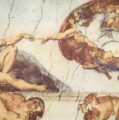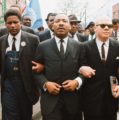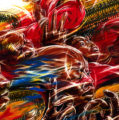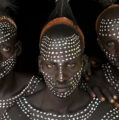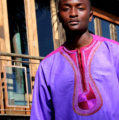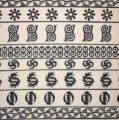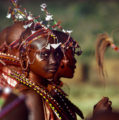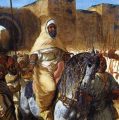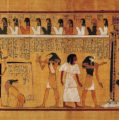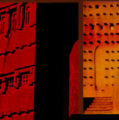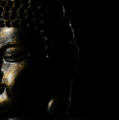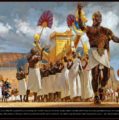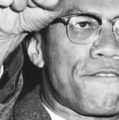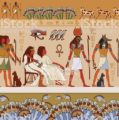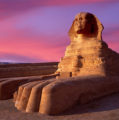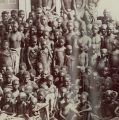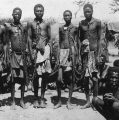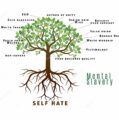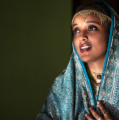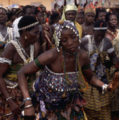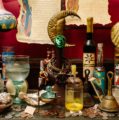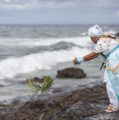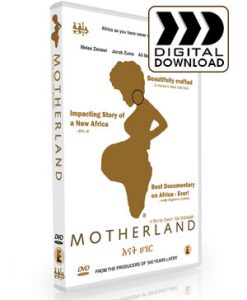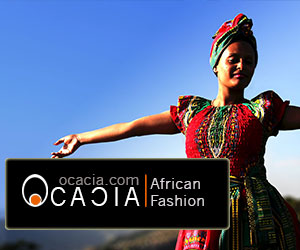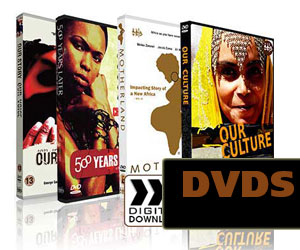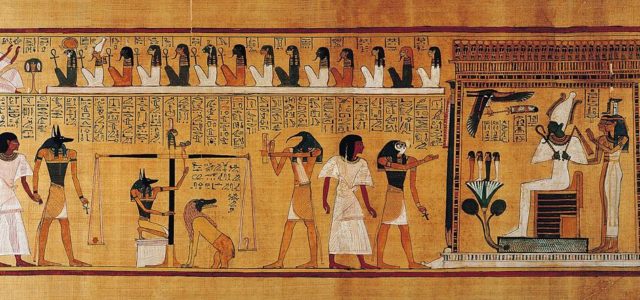
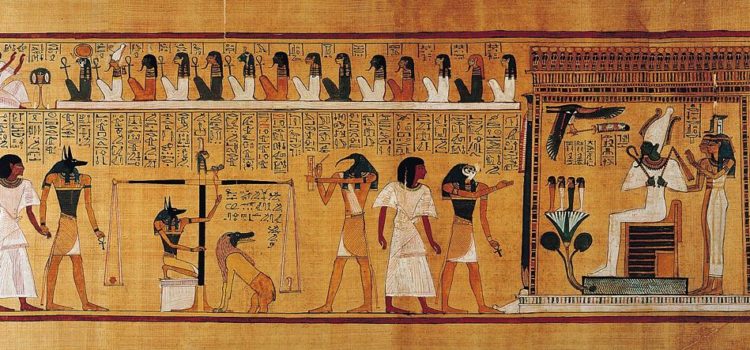

Africa’s History did not start with Slavery
It takes more than a horrifying transatlantic voyage chained in the filthy hold of a slave ship to erase someone’s culture–Maya Angelou
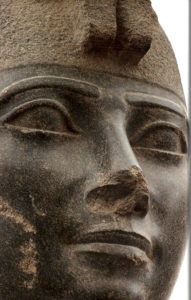
Nubian Statues in Modern Sudan
Africa’s history did not begin in slavery, and despite the peculiarity, horror, and duration of enslavement of Africans, slavery occupies a minor time-frame. Beyond cotton fields and civil rights in the 120,000 years of African history (0.5% of African history). In the last 50 years much has been done to combat the false and negative views about the history of Africa and Africans, Africa’s History did not start with Slavery.
which were developed in Europe in order to justify the Transatlantic Slave Trade and European colonial rule in Africa that followed it. Unfortunately the Eurocentric take on Africa and Eurocentric linguistics has distorted how some African scholars see Africa. Even those claiming to be progressive, discuss Africa as history’s perceptual victim—without any agency. Relegated to a simple disparaging color—black or Negroid, without even the ability to define anything in reality—even one’s self. But this is how they made Africans into slaves. By destroying/fracturing/interrupting that connection to Africa’s great past, and because there is no connection Africans globally have accepted being thugs and ho*es in someone else’s society. Pimps and dealers as opposed to Sultans and Kings. Builders of drug networks as opposed to builders of civilization. After all “education” shows Africa as nothing more than a primitive place over run by cannibal savages.
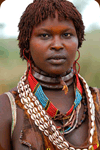
Not everyone in Africa was “tribal”
Many people have this view of Africa sitting still and being imposed on from outside. They forget that Africa was an active trade partner with Arabia, and China. There is even a special section in Israel for Orthodox Christian Ethiopian monks for 100’s of years for when they make pilgrimage. Africans have been to China before the European— not as slaves—but as partners. Africans discovered Europe before Europe “discovered” us (Islamic Spain etc). History, right now, needs to be put into perspective.
Many have been draining the African historical record by boxing in what is, and what does not constitutes an authentic African experience. Eurocentric terminologies place certain concepts outside of the African domain with this habit of “tribalizing” Africa; dark, pagan, licentious, unorganized, base and emotive. The legacy of washing out Africa’s historical record can be summed up by the racist words of the Scottish philosopher David Hume:
I am apt to suspect the Negroes to be naturally inferior to the Whites. There scarcely ever was a civilized nation of that complexion, nor even any individual, eminent either in action or in speculation. No ingenious manufacture among them, no arts, no sciences– David Hume
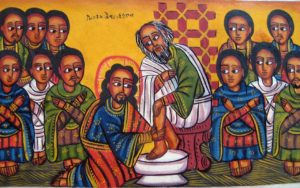
Ethiopian image of Jesus washing feet
‘”In the nineteenth century the German philosopher Hegel simply declared ‘ Africa is no historical part of the world. ‘ This openly racist view, that Africa had no history, was repeated by Hugh Trevor-Roper, Regius Professor of History at Oxford University , as late as 1963. The legacy of the African Holocaust has made a profound effect on African studies, where the default attitude is to deny African have contributed anything to what is considered civilization. Africans are playing on a chessboard where all the pieces are white. The volumes of published works by the Hitler’s of the African Holocaust is impossible for Africans to gain any foothold and authorities stance in their history.” So Ethiopia is a great civilization so it must be “outside of African origin”, Great Zimbabwe, Ancient Egypt, Moorish (Islamic Spain) are categorically denied as having anything African in them.
Africa had a history, long before the Europeans came to our shores. But the Europeans came to our shores and because they were attracted by what those who came first found (in our case it’s gold), and the first European establishment which established in Ghana was established at a place called El Mina, (The Mine), because gold was so abundant and they came with their manufacturing products in exchange for gold. So the Europeans initially came to our country to trade! As partners. It is perhaps the error of the slave trade which changed the perceptions of Europeans about Africans, when our own people were regarded as commodities–Issac Osei (500 Years Later)
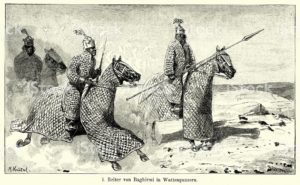
African Muslim Cavalry
AFRICAN KINGDOMS
See also | African Kingdoms
Africa produced a plethora of advanced civilizations. The most notable of these 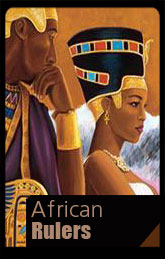 is the Nile Valley civilization From 3,000 BCE (founding of the First Dynasty), all the way until it was conquered by Persia around 525 BCE. So about 2,500 years. This was followed by the great civilizations of Axum and D’mt, and later by the great Islamic civilizations of the Sahel (Mali, Songhai, and the last in the later Sokoto). The famous Hajj of Mansa Musa in the 13th century was so profound it altered the currency of every country he passed through with his entourage. Later the Sokoto Caliphate is an Islamic spiritual community in Northern Nigeria, led by the Sultan of Sokoto . It was founded during the Fulani War in 1809 by Usman dan Fodio. Throughout the 1800s, it was one of the largest and most powerful empires in sub-Saharan Africa until British conquest in 1903.
is the Nile Valley civilization From 3,000 BCE (founding of the First Dynasty), all the way until it was conquered by Persia around 525 BCE. So about 2,500 years. This was followed by the great civilizations of Axum and D’mt, and later by the great Islamic civilizations of the Sahel (Mali, Songhai, and the last in the later Sokoto). The famous Hajj of Mansa Musa in the 13th century was so profound it altered the currency of every country he passed through with his entourage. Later the Sokoto Caliphate is an Islamic spiritual community in Northern Nigeria, led by the Sultan of Sokoto . It was founded during the Fulani War in 1809 by Usman dan Fodio. Throughout the 1800s, it was one of the largest and most powerful empires in sub-Saharan Africa until British conquest in 1903.
Despite the new wave of myths regarding Nubia and Kemet (Ancient Egypt) It is clear that Kemet and Nubia were neighboring African Civilizations just as Aksum and Nubia. Difference does’t mean Nubia was a ‘black race’ and Kemet wasn’t. Both groups were ethnic groups of indigenous African origin. The ethnic differences were no more significant than Ethiopians versus Kenyans. The largest empire in Ancient African history was the Songhai empire with its iconic leader Askia. The Aksum empire was the 3rd largest African empire at 1.25 million sq km. In the sixth century, the kingdom of Aksum (Axum) was doing what many elsewhere had been doing: pursuing trade and empire. Its exports of ivory, glass crystal, brass and copper items, and perhaps slaves, among other things, had brought prosperity to the kingdom.
BLACKNESS AND SLAVERY
See also | African Race | Language ‘Alik Shahadah

Diversity of African People
The people of Africa’ is more than a name, it is linked to indigenous rights and issues of sovereignty.‘Blackness’ fails at every level in both the historical and political context. Africans are the natural people of Africa: The hair, the skin, are all specific adaptations to living in the African landscape. The Motherland of these adaptations and the cultures is primarily Africa; hence the relevance of the name.[2]
Black history is the history of enslavement, African history is the history of humanity. If there are no White people, could there be Black people? For over 40,000 years there were only native people of Africa on the planet, and since there were no “White” people there could not have been Black people, since everyone would have been “Black.” And if all the “White people” vanished from the Earth, would the remaining “Black” people still be Black? So the older group must define itself relative to the European newcomers? Would it not make far more logical, historically, linguistically, and social to describe people by their land of origin. Negro = Negroid = Colored = Nigger = Black (all associated with color, none are connected to a continent). Now compare this to Asiatic, Caucasoid, and Mongoloid (all are tied to land, all can be located on a map– but not so Negroid/Black).
Black and White are therefore debunked as regressive incomplete terms for describing people. For all of recorded history we see in every conflict a central theme — that of “land.” So critical as humans need land to grow crops on, to source water from (see Golan Heights), they need a place to build cities and a place to harvest mineral wealth from. So attaching your identity to land makes sense: Attaching your identity to an abstract color, does not. Black and African are not interchangeable in any logical sense.
FACTS
See African Kingdoms | Facts about Africa
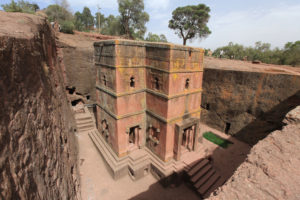
Lalibela: Ancient Stone church in Ethiopia
For the vast civilizations that existed in Africa. Christianity existed in Ethiopia long before there was the “Church of England”. Islam existed in Africa before it even reached outside of what is today the hinterland of Saudi Arabia. Libraries and universities existed in Islamic cities such as Timbuktu, where advance mathematics and astrology were studied. Between the current Islamophobic climate and the Eurocentric orientalist tradition many attempts, historically have been set up to mitigate the deep history of Islamic Africa–but the history of Islam is the history of Africa: As the history of the world is also the history of Africa. Africa has always been in the world, and an active agent shaping the world– not outside of it, nor a perpetual victim of it as many history books portray. In Ethiopia for 100s of years the Kebra Negast was written in the only surviving African native script Ge’ez. Ethiopia was the only African nation to actively repel colonialism and is one of the world’s oldest continuous civilizations.
Some of the most notable civilizations in human history come out of the Nile Valley in Africa, of these we know KMT (Ancient Egypt) and Nubia. Still today Western historians, as in the past, have tried to deny the African identity of these kingdoms,Africa has always been part of the Biblical, Jewish and Islamic world. It was a common site to see Ethiopians in Rome or anywhere in the “known” world. Modern day Israel was also a site for Ethiopian pilgrimage and Mecca was for Muslim Africa.
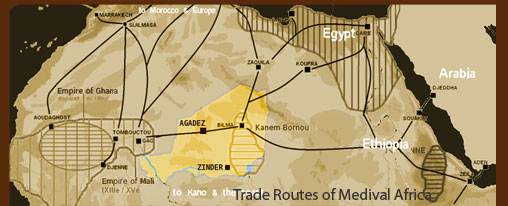
Ancient Islamic African Trade Routes
The historical trip of Kanka Musa was said to alter the economy of every state he passed through on his way to Mecca. So the story of Africa we are still clinging to is Victim Victim Victim. Mansa Musa clearly and utterly demonstrates not only that Africans were powerful, but also international. Mansa Musa remains the only man in recorded history to singularly control the gold value of the entire Mediterranean and was one of the richest men in history.
which are geographically located in Africa. Yet no one has seriously said Greece was not a European civilization, or Ancient China was not an Asian civilization. So this double standard is the legacy of the whitewashing of African history to satisfy the myth that Africa is outside of humanity, civilization and thus suitable for harvest by more advanced nations.
The denial of African agency has had a profound impact on how the world sees general history in the context of the African agent. Christian history is African history (Aksum ). The history of World civilizations is the history of Africa. The history of Islam is the history of Africa (1st Hijirah, Sokoto, Islamic Spain), you cannot divorced one from the other. The history of humanity is an African history.
History and development didn’t happen in isolation of African agency. Slavery and Colonialism did victimized Africans but Africans are not histories perpetual victims. Africans in antiquity had agency and made conscious choices which contributed to the development of humanity. In Aksum the course that Ezna took to make Christianity the state religion was based on his sovereign agency.
Regardless of orientation, to believe Africans have been on the receiving any of other people’s whims is to deny African human agency. Agency swings both ways and as much as it holds us accountable it also defines our station in civilization.
Religion In Africa Before Slavery
See also | African Belief |Traditional Healing | Islam and Africa | Vodon | African Christian.
Religion is a fundamental, perhaps the most important, influence in the life of most Africans Holocaust–J. O. Awolalu
Very few realize that “organized religion” started in Ancient Egypt. The first religious text was from Ancient Egypt. The 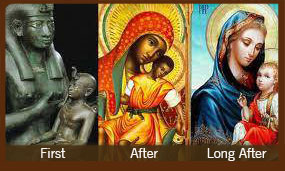 concepts we are so familiar within in the Abrahamic faiths, like judgment, hell, etc, all pre-existed in Ancient Egypt thousands of years before these newcomers.
concepts we are so familiar within in the Abrahamic faiths, like judgment, hell, etc, all pre-existed in Ancient Egypt thousands of years before these newcomers.
Most spiritual systems practiced by Africans, whether native or mainstream, are organized religions. The rituals of Voodoo, Orisha, Serer, etc are all highly organized, and without exception, function in communal setting. They all have degrees of a priest class, ceremony, immolation, libation, religious holidays, creation stories, saints, divine systems of punishment and reward.
The key difference is most native or traditional faiths are usually ethno-specific and generally lack a written tradition, and a prophet. (Awolalu) They also are less proselytizing compared to Islam and Christianity.[1] Beyond this even Indigenous beliefs systems share elements in common with each other, as well as with the Abrahamic faiths and other indigenous belief systems around the world.
Meskel Ethiopia from Halaqah Films on Vimeo.
Outside of the Abrahamic faiths, and perhaps faiths found in the Diaspora, many African religions are inseparable from the ethnic identity and culture. So the religion of the Serer is historically part of Serer identity, the religion of the Maasai is part of Maasai cultural identity.
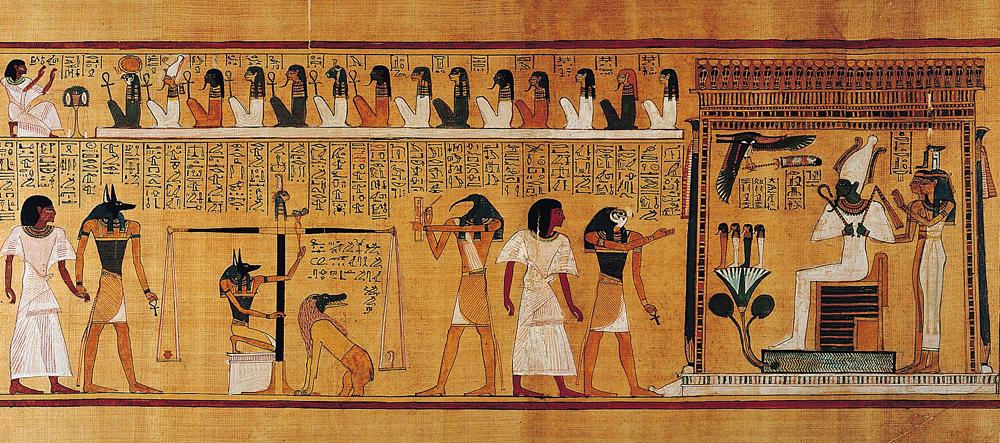
Most core tenets of Islam, Christianity and Judaism come from Ancient Egypt
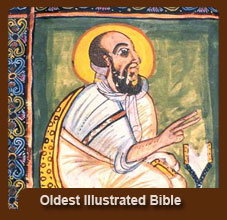 One erroneous idea is that all Africans had one “pagan” religion at some point in time. There is no ” original” religion for an entire continent of people, which is static over 60,000 years of African history. Religion all over the world is invariable tied to lifestyle so as people move from nomadic to sedentary, from chiefdoms to city state, from hunters to agriculturist—religion evolved to suit. There is also a profound relationship to culture, and more often than not, cultures are not destroyed by new faiths but modified to accommodate the tenants of the new religion. We see this in Judaism, Christianity and Islam. The greater the cultural agency of the group, the more they Africanize the incoming faiths into their political-cultural domain.
One erroneous idea is that all Africans had one “pagan” religion at some point in time. There is no ” original” religion for an entire continent of people, which is static over 60,000 years of African history. Religion all over the world is invariable tied to lifestyle so as people move from nomadic to sedentary, from chiefdoms to city state, from hunters to agriculturist—religion evolved to suit. There is also a profound relationship to culture, and more often than not, cultures are not destroyed by new faiths but modified to accommodate the tenants of the new religion. We see this in Judaism, Christianity and Islam. The greater the cultural agency of the group, the more they Africanize the incoming faiths into their political-cultural domain.
HIDDEN HISTORY AND ROMANCE
Specific knowledge of self vs Vague romantic fantasy: It was acceptable in the 60’s to just state “We were Kings and Queens in Africa.” Black History Month comes and goes and all we are still comfortable with this tired one-liner. But when you ask the Greeks about Greek history they are pretty specific and can speak about Battle of Thermopylae around 400 BCE, when you as
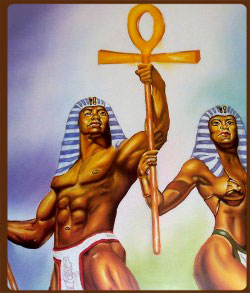
Afrocentric romance which goes no further than feel-good
k the Italians they tell you about Hadrian’s wall, Nero, the Colosseum, and the conquest of Germania, when you ask the Chinese they tell you of the terracotta sculptures depicting the armies of Qin Shi Huang around 209 BCE. When you ask the Persians they tell you about Xerxes and the golden age in Baghdad in the 9th century with specific reference to contributions to science, when you ask the Indians they tell you about The Taj Mahal commissioned in 1632 by the Mughal emperor, Shah Jahan. They all make films and cultural references to their history. Now despite the free flow of information Africans are content with “we were Kings and Queens in Africa.”
Ancient Africa had a predominantly, but not exclusively, oral tradition. But Ethiopia for 1000’s of years has used, and still uses a Ge’ez based native script.
And apart from Ajami (Arabic script for African languages), West Africa had Vai and Nsibidi. Not to mention the obvious Nile-Valley (Ancient Egyptian and Nubian) scripts at the beginning of civilization.Never heard of Menelik, never heard of Askia, never heard of Sokoto, Axum, never heard of Ancient Ghana, never heard of Lalibela or the great mosque in Goa.
And year after year this total lack of knowledge of self gets worse. And we are sending our children into the world with vague mythology and accusations of “they stole everything from us” and wonder why they have no self-confidence. And what is the excuse? Have we not also made films and written books? So the only person who destroyed or hide African history is the trivial people who do not study it.
SCRIPTS OF AFRICA
See | Scripts of Africa
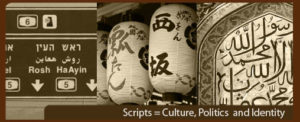 Ancient Africa had a predominantly, but not exclusively, oral tradition. But Ethiopia for 1000’s of years has used, and still uses a Ge’ez based native script. And apart from Ajami (Arabic script for African languages), West Africa had Vai and Nsibidi. Not to mention the obvious Nile-Valley (Ancient Egyptian and Nubian) scripts at the beginning of civilization.
Ancient Africa had a predominantly, but not exclusively, oral tradition. But Ethiopia for 1000’s of years has used, and still uses a Ge’ez based native script. And apart from Ajami (Arabic script for African languages), West Africa had Vai and Nsibidi. Not to mention the obvious Nile-Valley (Ancient Egyptian and Nubian) scripts at the beginning of civilization.
ETHIOPIA AS A WORLD POWER
See | Kebra Negast
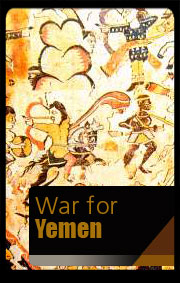
Ethiopia war for Yemen
In 522, before Khosrau’s reign, a group of monophysite Ethiopians led an attack on the dominant Himyarites of southern Arabia. The local Arab leader was able to resist the attack, and appealed to the Sassanians for aid, while the Ethiopians subsequently turned towards the Byzantines for help. The Ethiopians sent another force across the Red Sea and this time successfully killed the Arab leader and replaced him with an Ethiopian man to be king of the region.[Frye Ancient Iran] In 531, Justinian suggested that the Ethiopians of Yemen should cut out the Persians from Indian trade by maritime trade with the Indians.The Ethiopians never met this request because an Ethiopian general named Abraha took control of the Yemenite throne and created an independent nation. After Abraha’s death one of his sons, Ma’d-Karib, went into exile while his half-brother took the throne.
After being denied by Justinian, Ma’d-Karib sought help from Khosrau, who sent a small fleet and army under commander Vahriz to depose the current king of Yemen. After capturing the capital city San’a’l, Ma’d-Karib’s son, Saif, was put on the throne. Justinian was ultimately responsible for Sasanian maritime presence in Yemen. By not providing the Yemenite Arabs support, Khosrau was able to help Ma’d-Karib and subsequently established Yemen as a principality of the Sassanian Empire.
AFRICA’S INTERNATIONAL RELATIONS
Africa, in European writings was considered the Dark Continent; it existed on the fringes of European comprehension, however, Europeans were very late in terms of contact with Africa. A vibrant international trade was in existence thousands of years before their arrival. China in the 10th and 11th centuries traded with East Africa which boomed during the Ming Dynasty under the leadership of the Chinese Muslim seafarers Cheng Ho. East African emissaries visited China during this period to pay homage to the Chinese Emperor. Africa’s interface with Europe is also very ancient; Islamic Spain was ruled and governed for nearly 800 years by a condominium of African Moors from North and West Africa and Arabs in the 7th century. During this period African leaders such as Yakub Al-Mansur, stood undefeated in his conquest of Andalusia, he sold European prisoners of war to chiefs in his native Africa. 800 years past until the Africans and Arabs were expelled in 1492 around the time Cristóbal Colón made his maiden voyage.
Prior to Islamic Spain there were 2500 year old African mask found in Cadiz, this testifies to an ancient international trade of equal civilisations. The legend of African Hannibal Barca assault on the Romans makes it clear that African in fact discovered Europe long before Europe discovered Africa. Africans have always populated Europe; it was commonplace to see Ethiopians going about their business in ancient Rome. Up until 1550 10 % of Portugal was African but intermarriage has absorbed the African presents in the population.
How Europe learned from Africa
Some of the world’s other great civilizations, such as Kush, Aksum , Ghana , Mali , and Great Zimbabwe , also flourished in Africa and some major scientific advances were known in Africa long before they were known in Europe . Towards the middle of the 12 th century, the north African scientist, Al Idrisi, wrote, ‘What results from the opinion of philosophers, learned men and those skilled in observation of the heavenly bodies, is that the world is as round as a sphere, of which the waters are adherent and maintained upon its surface by natural equilibrium.’ Africans were certainly involved in trans-oceanic travel long before Europeans and there is some evidence to suggest that Africans crossed the Atlantic and reached the American continent, perhaps even north America , as early as 500 BC. In the 14 th century, the Syrian writer, al-Umari, wrote about the voyage of the Emperor of Mali who crossed the Atlantic with 2000 ships but failed to return. Africans in east and south-eastern Africa also set up great civilizations that established important trading links with the kingdoms and empires of India and China long before Europeans had learned how to navigate the Atlantic ocean . When Europeans first sailed to Africa in the 15 th century, African pilots and navigators shared with them their knowledge of trans-oceanic travel.
It was gold from the great empires of West Africa , Ghana , Mali and Songhai, which provided the means for the economic take off of Europe in the 13 th and 14 th centuries and aroused the interest of Europeans in western Africa . An early historian in the 9 th century wrote ‘the king of Ghana is a great king. In his territory are mines of gold.’ When the famous historian of Muslim Spain, al-Bakri wrote about Ghana in the 11 th century, he reported that its king ‘rules an enormous kingdom and has great power’ . The king of Ghana was said to have an army of 200,000 men and to rule over an extremely wealthy trading empire. In the 14 th century, the west African empire of Mali was larger than western Europe and reputed to be one of the largest, richest and most powerful states in the world. The Moroccan traveler Ibn Batuta wrote about his very favorable impressions of this empire and said that he found ‘complete and general safety’ there.
When the famous emperor of Mali , Mansa Musa visited Cairo in 1324, it was said that he brought so much gold with him that its price fell dramatically and had not recovered its value even 12 years later. The empire of Songhay was known, among other things, for the famous university of Sankore based in Timbuktu. Aristotle was studied at Sankore and also subjects such as law, various branches of philosophy, dialectic, grammar, rhetoric and astronomy. In the 16 th century one of its most famous scholars, Ahmed Baba, is said to have written more than 40 major books on subjects such as astronomy, history and theology and he had his own private library that held over 1500 volumes. One of the first reports of Timbuktu to reach Europe was by Leo Africanus. In his book, published in 1550, he says of the town: ‘There you will find many judges, professors and devout men, all handsomely maintained by the king, who holds scholars in much honor. There too they sell many handwritten north African books, and more profit is to be made there from the sale of books than from any other branch of trade.’
African knowledge and that of the ancient world, was transmitted to Europe as a result of the North African or Moorish conquest of the Iberian peninsular in the 8 th century. There were in fact several such conquests including two by the Berber dynasties in the 11th and 12 th centuries. The Muslim invasion of Europe, and the founding of the state of Cordoba , re-introduced all the learning of the ancient world as well as the various contributions made by Islamic scholars and linked Europe much more closely with north and West Africa . Arabic numerals based on those used in India were introduced and they helped simplify mathematical calculations. Europe was also introduced to the learning of ancient world mainly through translations in Arabic of works in medicine, chemistry, astronomy, mathematics and philosophy. So important was the knowledge found in Muslim Spain, that one Christian monk – Adelard of Bath – disguised himself as a Muslim in order to study at the university at Cordoba . Many historians believe that it was this knowledge, brought to Europe through Muslim Spain, which not only created the conditions for the Renaissance but also for the eventual expansion of Europe overseas in the 15 th century.
European views before the Slave Trade
Before the devastation of the Transatlantic Slave Trade important diplomatic and trading partnerships had developed between the rulers of European countries and those of Africa who saw each other as equals. Some of the earliest European visitors to Africa recognised that many African societies were as advanced or even more advanced than their own.
In the early 16 th century, the Portuguese trader Duarte Barboosa said of the east African city Kilwa: There were many fair houses of stone and mortar, well arranged in streets. Around it were streams and orchards with many channels of sweet water.’ Of the inhabitants of Kilwa he reported, ‘They were finely clad in many rich garments of gold and silk, and cotton, and the women as well; also with much gold and silver in chains and bracelets, which they wore on their legs and arms, and many jeweled earring s in their ears.’
A Dutch traveler to the kingdom of Benin in the early 17 th century sent home this report of the capital.
‘It looks very big when you enter it for you go into a great broad street, which, though not paved, seems to be seven or eight times broader than the Warmoes Street in Amsterdam. This street continues for about four miles and has no bend in it. At the gate where I went in on horseback, I saw a big wall, very thick and made of earth, with a deep ditch outside. Outside the gate there is a large suburb. Inside as you go along the main street, you can see other broad streets on either side, and these are also straight. The houses in this town stand in good order, one close to the other and evenly placed beside the next, like our houses in Holland.’ Africans and the African continent have made enormous contributions to human history just as other peoples and continents have. It is the development of Eurocentric and racist views in Europe that have denied this fact and sought to negate the history of Africa and its peoples.
Academic Racism
The legacy of the African Holocaust has made a profound effect on African academics. As Africans have a profound disinheritance in areas of social-economic, there has also been a destructive disinheritance in areas of academics. We are playing on a chessboard where all the pieces are white. The volumes of published works by the Hitler’s of the African Holocaust is impossible for Africans to gain any foothold and authorities stance in their history. Year after year, the bookshelves are filled with one opinion. The most “popular” Africans are those singing from this music score. Some of the most racist and pejorative material today is taught in schools in an attempt to vindicate the continuation of academic racism.
The self-referencing of the “old boys” like Hume and Kant is valid today because it is old, white, and used many, many times. It is thus impossible for the frustrated African to gain any ground because he/she is in a battle whose parameters are set by foes on a battlefield tipped economically, socially, in favor of the opposition. We often hear “so and so is acknowledged by everyone to be one of the most prominent scholars of …” so and so is always white. Scholarship is a white only seat, academic apartheid with no room for debate. Aspects of academia which are dead and buried, but still in use. Any African academic discussing or having a positive take on Africa that contradicts their assertion is called Afrocentric, as if this form of opinion is a cultural slant loaded with the bias of a pseudo-history. They say with one breath that Eurocentric academics were “men of their time” but still keep saying these people were the definitive guide to Africa. How can you say something is wrong but keep using it as a definitive source? The complete dismantlement (deconstruction) of the academic paradigm of authority needs to be a first step in a pure analysis, and it is for Africans to adopt this approach as bases for articulating and imposing a new identify. And in this we cannot overlook the significance of linguistics as a function of oppression. See Agency
Language and Racism against Africa
To highlight the academic dilemma against Africans it is necessarily to just site one of Europe’s key historians on slavery. The age of the work and the period it was written in seem to make little impression in universities today, who seem to neglect the social status of Africans in the time these so-called scholarly books were being written in. It also neglects to highlight the mindset of the authors of these works and their contribution to the obscuring and footnoting of African history and African contributions to civilization. Men who would be labeled by a self-determined African today are referenced and cited with little challenge. Despite all the new research and development, this dead racist scholarship is still held high as the authentic source on Africa . Almost as if the more you reference a bad source the more authentic it becomes. The foundation of history of Africa cannot be studied outside of the dynamics of race and racism in the writings of African conquers. This is not to dismiss their entire work, but surely to raise the red flag of sincerity, and subsequently expose the agendas behind these scribbling. J.D. Fage sits high on this throne of Anti-African rhetoric [ii]
“Today, however, some scholars assert that slavery did not have a wholly disastrous effect on those left behind in Africa .” [iii]
Imagine stating that some scholars believed the Jewish Holocaust was not entirely disastrous. We must assume there is again some degree of salvation in the actions of the Europeans who saved Africa from their own continent. It is like saying the Jewish Holocaust was beneficial because some Jews got senior position in the Nazi army, or slavery was good because Africans got free Caribbean cruises. It is funny that if a person states that genocide was good for Jews that person would be either considered mad or a neo-Nazi, however to suggest slavery was good for Africans makes someone an academic.
“At its peak, the Atlantic slave trade took about 90,000 slaves per year out of a total population of around 25 million in just Guinea , where the vast majority originated. This number was significant, yet only a moderate annual growth rate in population was enough to sustain it by replacement. Therefore, the slave trade is unlikely to have caused a decrease in the population of West Africa , though it may have reduced or even halted population growth in some regions.” [iv]
Again, we see the apology and denial of the consequences of enslavement [v] . What this is saying is the harvesting of African people was done sustainable and that it had no demographic consequences on birth rate, it would be worth mentioning that the most viral and healthiest members where been exported overseas so it is inconceivable that it would not affect population demographics not to mention settlement patterns and human social potential.
“The Nok civilization is argued by some to prove that Africa had a civilization prior to the arrival of Europe . “
This kind of tone appears to vindicate Africa but it actually introduces reasonable doubt. Its references again the false notion of a primitive Africa as a half-valid hypothesis for it shows by implication that anything or everything in Africa has to be articulated by juxtaposition. African civilization does not require any proof or revolutionary rethink. This kind of reasoning follows from “he seems very educated for a black” or “you see they are not all savages.” What needs to be done is exposed the motives behind those removing African agency from the annals of world cultural contributions.
“For those left behind in Africa the standard of living increased substantially and the region became divided into highly centralized and powerful nation states, such as Dahomey and the Ashanti Confederacy. It also created a class of very wealthy and highly Europeanized traders who began to send their children to European Universities. [vi]
The contempt in Eurocentrism is so self-evident it almost needs no commentary to identify either intention or fallacies. It is be restated the source of this material comes from a respected seminal academic and authority on Africa . Before Europe , we know the Kanka Musa had gold reserves that made Ancient Mali one of the riches economies in the Ancient world. It is also a fact that Sankore was an African university so notable that Arabs and others came to study there. All of these non-direct facts retort the claims that contact with Europe brought power and education. Also the statement about Europeanized traders is intended by the author as a compliment a kind of accession of the African from savage beast to Europeanized. Fage trips and stabs himself with his own pen and exposes and implements himself as one of the historical agents of academic racism that has distorted the African historical timeline.
BLACK AFRICA IS A RACIST TERM
Nobody on this planet puts a adjective on their identity, especially when they are a majority, except African people. Black Africa, Dark Continent, Heart of Darkness all articulate the colonial contempt for a continent and its people. But how does one arrive at the term “black Africans,” are there green Africans? Would you speak of “yellow Chinese,” or “brown Indians”? Globally the term ” Red Indian” is rejected as deeply pejorative yet “black African” is still used even in South Africa which is used to define the majority of the population against the minority so-called white-Africans. Black African is as ridiculous as “rock stone”, rocks are stones so why double up two realities which are often the same?
There is only one reason the term Black African exists and that is to deny nobility from African people. To explain away how Egypt could be nested in Africa but at the same time divorced from the majority of the African people. Therefore the argument “yes it is in Africa, but it is not Black African.” It is almost like saying Greece was a European civilization, but not a White European civilization.
If 95% of Africans are “Black” (capital B, if it must be used) then the minority should bear the adjective–not the majority. It is disrespectful to describe Africans with a label based solely on a color, especially when it does not accurately reflect the physical appearance of most Africans. This is made even more offensive when the etymological root of that label (black) is derived from the word Negro, and is used in place of the word African as a racial or cultural identity. In reality we must ask ourselves what is the difference between “Negro” and “Black” save historical association, the words mean the same thing, so we have moved from being Black in Spanish (negro) to Black in English (black). It is strange that despite all the genetic research and advance human anthropology we are still clinging to primitive 18th century post-Darwin model of race, which sole aim was/is to segregate and de-culturalize and enslave.
The concept of a “black Africa ” is a Eurocentric term based upon their ignorant primitive regressive deductions. It is true Arabs and Greeks referred to Africans as “black” but this was not a racial label, and moreover Africans themselves did not self-apply these external labels. Like the Phoenician who were called the “red people,” but no Phoenician would have referred to themselves in this way.

